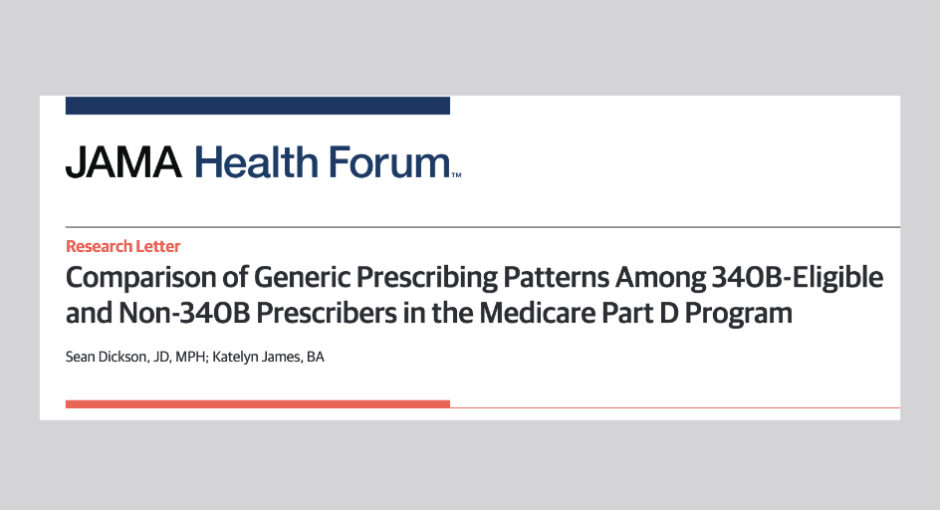340B-eligible providers prescribe generic drugs at the same overall rate as non-340B providers, a study published in JAMA Health Forum found. “We found no evidence that 340B-eligible prescribers were systematically overprescribing brand-name drugs to generate revenue,” the authors said.
The May 19 study compared generic prescribing patterns in 2020 across therapeutic classes between 340B and non-340B prescribers in the Medicare Part D program. The researchers said they believed their analysis represents the first such comparison to focus on Part D drug prescribing. The study’s lead researcher, drug policy expert Sean Dickson, has conducted significant research on other 340B issues.
“We found no meaningful difference in overall generic prescribing rates,” the researchers said in a report on the findings. “Overall, we found no evidence that the 340B program is leading to systematically higher spending on brand-name drugs in the Medicare Part D program.”
The new study adds to conflicting research findings on whether 340B hospitals buy and/or prescribe more expensive medicines than others. Prominent examples include:
- A June 2015 U.S. Government Accountability Office report that found that “per beneficiary Medicare Part B drug spending, including oncology drug spending, was substantially higher at 340B [disproportionate share] hospitals than at non-340B hospitals.” GAO said that “this indicates that, on average, beneficiaries at 340B DSH hospitals were either prescribed more drugs or more expensive drugs than beneficiaries at the other hospitals.”
- A February 2018 study published in the New England Journal of Medicine found that hospital eligibility for 340B was associated with “significantly higher” administration of Medicare Part B drugs in hematology–oncology and ophthalmology without clear evidence of expanded care or lower mortality among low-income patients.
- Hospital group 340B Health issued a study in 2018 that found that 340B DSH hospitals provide a higher level of care to low-income patients compared to non-340B hospitals and are more likely than non-340B hospitals to provide specialized services that are critical to vulnerable patients but are often underpaid.
- The Medicare Payment Advisory Commission reported in March 2020 that it found “no clear evidence of increased spending on cancer drugs attributable” to hospitals’ 340B status.
- A February 2022 study published in JAMA Network Open “no statistically significant difference in Medicare Part B drug spending between 340B hospitals and non-340B hospitals.”
The new study in JAMA found that, overall, 86.6% of 2020 Part D prescriptions were for generic drugs, and that for 340B-eligible prescribers, 86.4% of prescriptions were generic, versus 86.6% for non-340B prescribers. “In practice, there was no apparent difference in generic prescribing by 340B status,” the researchers said. In fact, after adjusting for differences in therapeutic class mix, 340B and non-340B prescribers had the same generic prescribing rate of 86.6%.
The researchers added that, while they saw variation in both directions at the therapeutic class level, they still “found no evidence that 340B-eligible prescribers were systematically overprescribing brand-name drugs to generate revenue.” The therapeutic class analysis showed:
- 11 classes where 340B prescribers had statistically significant higher generic prescribing rates.
- 17 classes where non-340B prescribers had statistically significant higher generic prescribing rates.
- Of the categories with statistically significant differences, three-quarters had a difference of less than 2 percentage points.
- Anti-migraine drugs—accounting for just 1% of all prescriptions assessed—had the largest variation, with 340B prescribers at 84.6% generic prescribing rate, versus 78.5% for non-340B prescribers.
- For cardiovascular drugs—accounting for a quarter of all prescriptions assessed—340B prescribers had 95.9% generic prescribing rate, versus 95.7% for non-340B prescribers.
The variance in generic prescribing patterns could be due to differences in patient health status, as 340B-eligible patients covered by Medicare are more likely to be dual eligible and/or disabled, the researchers noted. Also, variations may be wider among drug classes with lower overall utilization, since the highest-use class, cardiovascular drugs, showed near-equal generic prescribing rates, they said.
The researchers cautioned that possible errors in data matching and class-level aggregation may have obscured prescribing variation for specific conditions.
To conduct the study, the researchers said they linked National Provider Identifiers in the Medicare Part D prescriber utilization file to the 340B covered entity database to determine whether a prescriber was 340B eligible, based on the registered practice. In addition, they matched drugs to US Pharmacopeia therapeutic classes and calculated the totals of generic and total prescriptions for 2020 within each class for 340B and non-340B prescribers.
Lead Researcher Dickson conducted the research and wrote the article while he was at the West Health Policy Center in Washington, D.C. Katelyn James was the co-author. According to its web site, part of West Health’s mission is to “provide analysis on addressing the U.S. healthcare and prescription drug cost crisis.” Dickson is currently senior vice president of pharmaceutical policy and strategy at America’s Health Insurance Plans (AHIP). His past published research in the 340B space incudes a September 2020 study suggesting that increases in the percentage of drug sales subject to inflation penalties in the 340B program were associated with lower drug price hikes. Another study conducted in July 2019 focused on three costly hepatitis C drugs and found that drug makers can lower a drug’s list price to reduce exposure both to 340B discounts, and increase net revenues.


